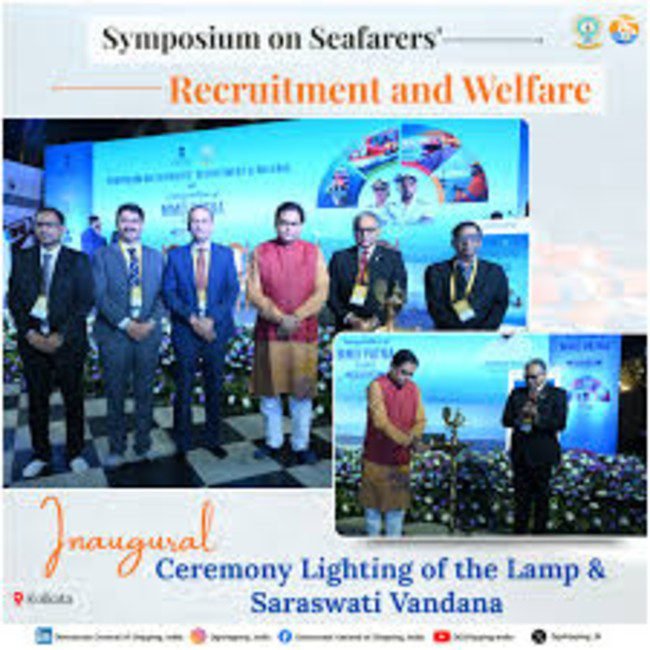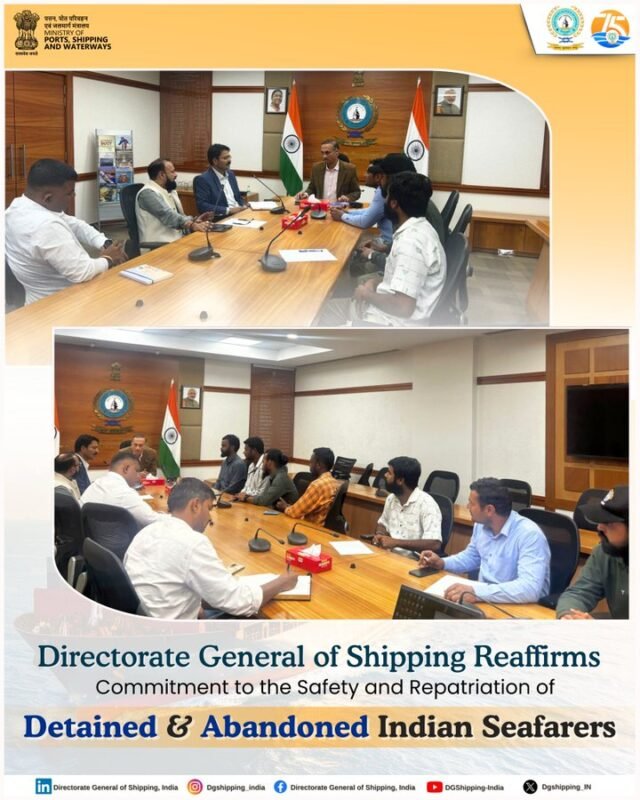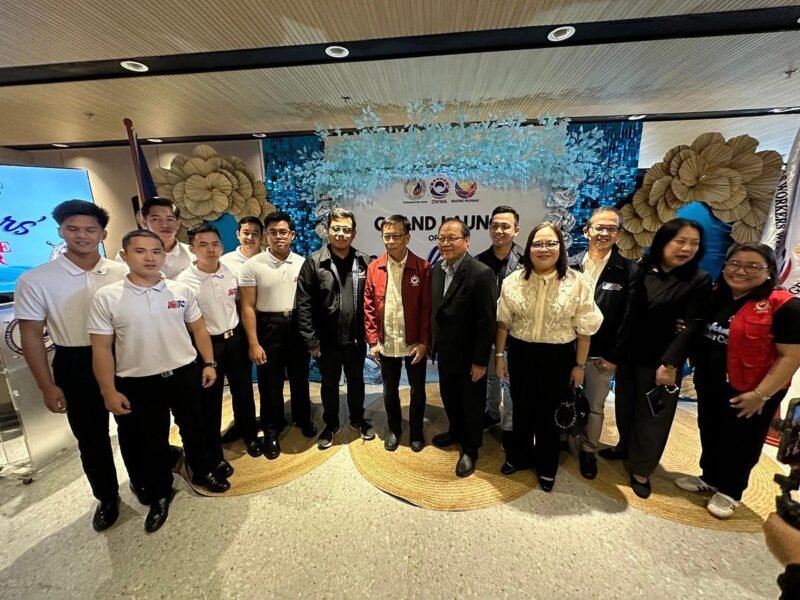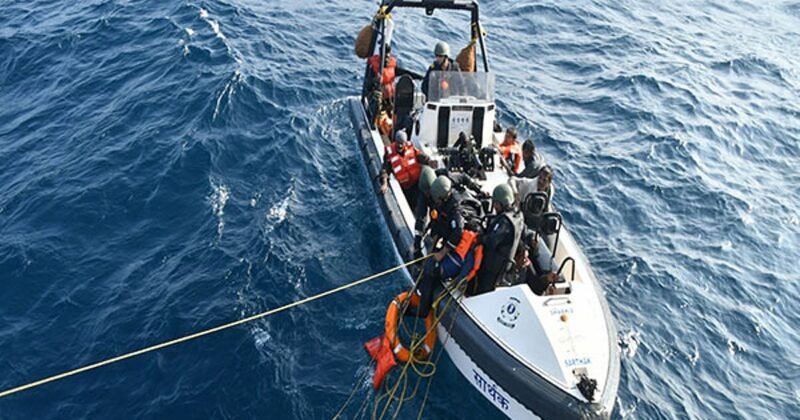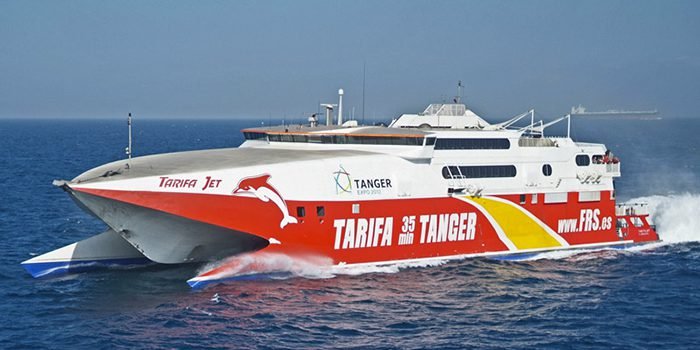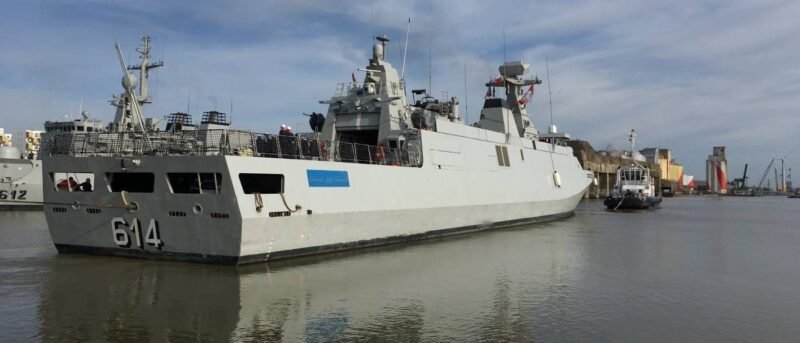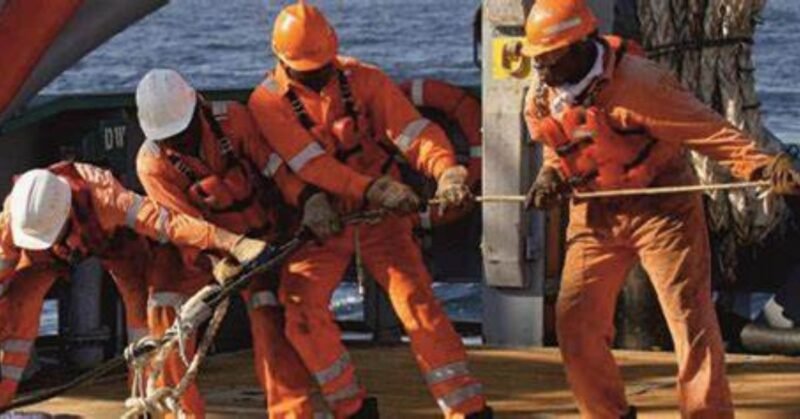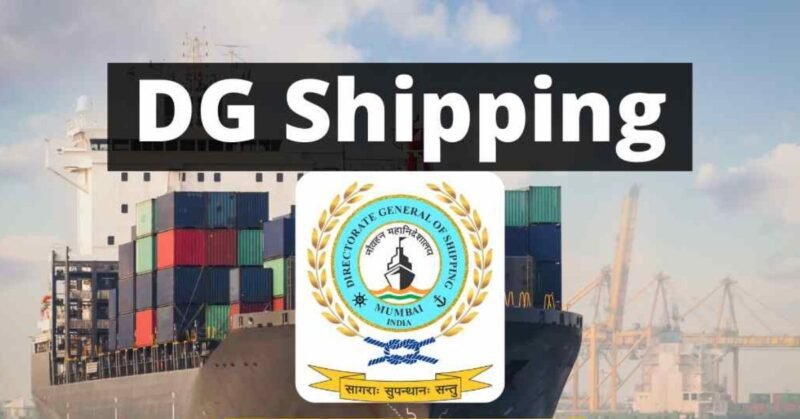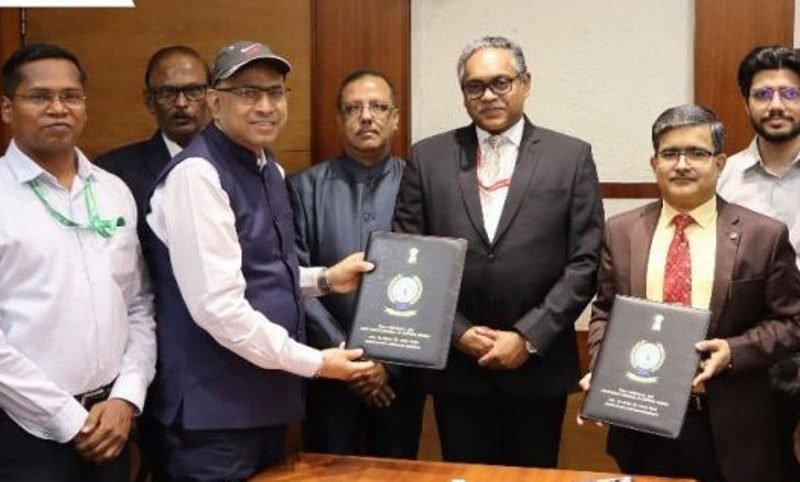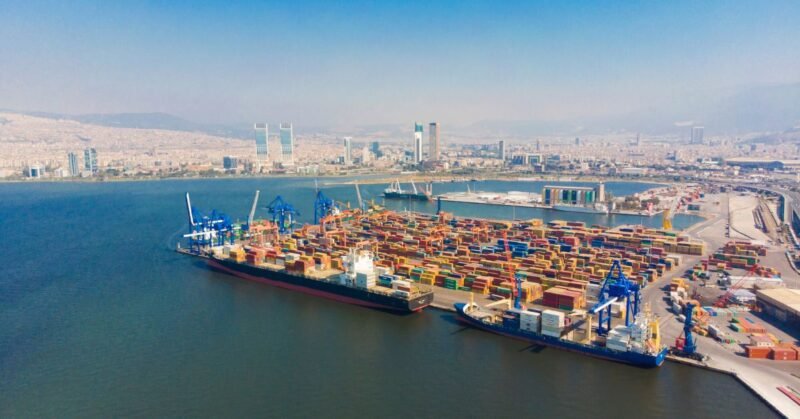Following Stories compiled in this News Digest for the week from 26 Sep 2022 to 02 Oct 2022 in descending order:
- Panama provides priority access to Seafarers at the Tocumen International Airport
- India: PM Narendra Modi inaugurates Ro-Pax ferry service in Gujarat
- Hong Kong Adding Batteries and Solar Panels to Next Generation Ferries
- India: Directorate General of Shipping celebrates ‘World Maritime Day 2022’
- Wind-powered cargo capacity surpasses 1 mln dwt milestone
- Abandonment of seafarers set to reach record levels in 2022
- Pragmatic action on seafarer wellbeing crucial for a resilient shipping industry
- India’s Longest River Cruise Service, Covering 4,000 Km Distance, To Begin From Early 2023 Between Varanasi, Bogibeel: Govt
- Keep seafarers in mind when developing shipping technology, says InterManager
- Maritime charity announces winner of annual photography competition
- Singapore fights maritime talent battle
- Autonomous shipping and human training: Where we stand
- Safety paramount in early-stage ammonia and hydrogen projects
- EU Approves Extending Seafarers’ Scheme
- International Seafarers Suffer $65 Million in Wage Theft Annually in Australian Waters
- Environmental technologies in focus on World Maritime Day 2022
- Design plans for 100% electric ‘flying’ ferry unveiled
Panama provides priority access to Seafarers at the Tocumen International Airport
02 Oct 2022
To commemorate the World Maritime Day, established by the International Maritime Organization (IMO), as an expression of gratitude to demonstrate the support of the Republic of Panama to the key workers that are the Seafarers, for being an essential element to maintain the open and operational global economy by playing a vital role in maritime transport, the Panama Maritime Authority (AMP), the National Migration Service (SNM) and the Tocumen International Airport, S.A, in a joint effort established priority access with a signaling indicated by the word “gente de mar /seafarers ()”.

It is important to highlight that the Tocumen International Airport is the only one in Latin America in the top 10 of global air traffic, making Panama the epicenter of air connectivity in the region, in which seafarers from all over the world converge. For this reason, it is opportune to establish measures that facilitate their transit, while they use the airway to be repatriated, change crews or reach their homes, since between 80 and 90% of world trade is transported by sea.
This access has been enabled for seafarers through a line at the passport control post, arranged for diplomatic personnel, people with disabilities and cabin crew, as a way of offering hospitality and recognition, being one of the First countries to implement it, we urge other nations to contribute to seafarers and support initiatives that benefit them.
Providing them with accessibility during their stay at our airport is the way Panama marks a milestone and highlights World Maritime Day 2022, whose slogan is New Technologies for a Greener Maritime Transport, in which seafarers have a very important role, by making effective the application of all these environmental regulations and by supporting a green transition of the maritime sector towards a sustainable future, for present and future generations. Reference
India: PM Narendra Modi inaugurates Ro-Pax ferry service in Gujarat
01 Oct 2022
Prime Minister Narendra Modi on Sunday inaugurated a Ro-Pax ferry service between Hazira near Surat and Ghogha in Bhavnagar district. The service will reduce the 375-km road distance between Bhavnagar and Surat to 90-km by sea route, Modi said while flagging off the service via video conferencing.

It will save time and fuel and boost eco and religious tourism in the Saurashtra region of the state, a release issued by the Prime Minister’s Office (PMO) earlier said.
The three-deck Ro-Pax Ferry Vessel ‘Voyage Symphony’ connecting Hazira in Surat district of south Gujarat and Ghogha in Saurashtra’s Bhavnagar has a load capacity of 30 trucks, 100 passenger cars, and 500 passengers plus 34 crew and hospitality staff, it said. Reference
Hong Kong Adding Batteries and Solar Panels to Next Generation Ferries
01 Oct 2022
Hong Kong is moving forward with a new generation of ferries that will be among the most environmentally friendly yet built. The nine high-speed passenger vessels are designed to transport over five million people annually on three routes between Hong Kong and outlying islands Lamma Island, Peng Chau, and Hei Ling Chau.

This new generation of vessels will be built under the Hong Kong Government Vessel Subsidy Scheme. The goal of the project is to replace existing ferries while upgrading safety and environmental standards including ensuring compliance with the safety standard High-Speed Craft Code 2000.
The nine high-speed craft will measure between approximately 115 and 130 feet. Eight of the vessels will be built entirely of carbon fiber composite while one vessel will be aluminum. The ferries will be built in Hong Kong by Cheoy Lee Shipyards, which according to Bureau Veritas, which is the classification society for the project, is one of the few yards in the world to routinely build vessels with steel, fiberglass, aluminum, and various combinations of these materials.
Energy efficiency and improved environmental performance are the top priorities for the new vessels. All nine of the ferries will be fitted with approximately 1,000 square feet of solar panels and battery systems to capture solar energy for on-board electricity consumption. The hybrid vessels will also be fitted with air-cooled Lithium-ion modular battery systems as an alternative propulsion system.
The main propulsion systems will be marine diesel engines compliant with IMO Tier III requirements. In addition, two of the nine vessels will be propelled by diesel-electric hybrid propulsion systems as part of a trial program led by Hong Kong’s Environmental Protection Department. This will enable these ferries to operate in zero-emission mode as an option during maneuvering and berthing. Reference
India: Directorate General of Shipping celebrates ‘World Maritime Day 2022’
30 Sep 2022
‘World Maritime Day 2022’ was celebrated virtually today (September 26, 2022) in the presence of a huge number of stakeholders from the maritime industry, Government officials, Seafarers and their families in India and abroad. International Maritime Organization (IMO) has chosen the theme – “New Technologies for Greener Shipping” for the year 2022.

In a goodwill message, Shri Sarbananda Sonowal, Union Minister of Ports, Shipping and Waterways and AYUSH expressed confidence that the advent of new and modern technologies will bring about major improvements in the maritime eco-systems and help us to progress towards greener shipping at a fast pace.
In a video message, Mr. Kitack Lim, Hon’ble Secretary General, IMO stated that new technologies for greener shipping opens up a larger conversation about shipping’s direction and how technology can be harnessed for a more sustainable future.
While addressing the gathering, Shri Amitabh Kumar, Director General of Shipping & Chairman, NMDC, Central Committee presented importance of the World Maritime Day and informed the developments made by the Government of India in the maritime field, particularly for Greener Shipping as well our future prospects. He touched upon various developments in relation to Maritime India Vision-2030, National Hydrogen Mission, National Policy on Biofuels, Regulatory regime for ship owners to pilot or adopt alternate fuels and technologies, adopting various study based futuristic policies to ensure smooth transition to Green Shipping through involvement in international initiatives such as Green Corridors with QUAD, IMO-Norway Green Voyage 2050, etc. He informed that India has been selected as Pioneer Pilot Countries (PPCs) for IMO-Norway Green Voyage, 2050 project and also as the first country for piloting a green shipping project under Green Voyage. Reference
Wind-powered cargo capacity surpasses 1 mln dwt milestone
30 Sep 2022
The latest installations of wind propulsion technology on large commercial vessels have pushed the global cargo capacity of vessels that make use of wind as a renewable energy source over the one million tonnes of deadweight (dwt) milestone.

Currently, twenty-one large commercial vessels have wind propulsion systems installed onboard. By the end of this year, the International Windship Association (IWSA) estimates that wind propulsion technology will be installed on around twenty-five large commercial vessels, representing 1.2 million dwt.
Based on public announcements and shipyard orders made to-date, IWSA also estimates that by the end of 2023, up to fifty large ships will be making use of wind as a renewable energy source with a combined tonnage of over three million DWT.
In addition to the fleet of large commercial ships sailing with wind propulsion technology installed, ten small cruise ships currently use traditional soft sail technology representing a further 50,000 Gross Register Tonnage (GRT). There are also a growing number of smaller vessels (under 400 GRT) using wind propulsion technology. The number of smaller vessels is likely to grow further next year as more vessels are converted to sail cargo, retrofits on small fishing vessels are undertaken, and a demonstrator vessel is launched in the South Pacific.
The timing of wind-powered ship propulsion passing this pivotal milestone comes in the same week that the industry celebrates World Maritime Day and its theme “New Technologies for Greener Shipping”.
Wind-assisted propulsion can be implemented on a wide range of ships that have a clear deck area, such as ferries, car carriers, bulk carriers and tankers, while containerships are more difficult to retrofit for the majority of these solutions. Reference
Abandonment of seafarers set to reach record levels in 2022
30 Sep 2022
Maritime is facing a rising humanitarian crisis as cases of seafarer abandonment around the world are likely to reach record levels for a third year in a row, according to figures presented at a conference ahead of World Maritime Day. Deborah McPherson reports

A record 95 cases were reported last year to a global database according to statistics presented from the International Maritime Organization (IMO) during an online panel discussion. With 91 cases already reported so far this year, the 2021 figures are predicted be surpassed again by possibly 50%, heard the webinar organised by maritime charity Stella Maris.
The rise was attributed in part to the economic and logistical fallout of the Covid-19 pandemic and the crew change crisis, where crews were stranded without wages or basic necessities, far from home, for months on end – 17 of the 85 cases reported during 2020 related to consequences of the pandemic. But the rise was also likely to correlate in part to 2014 amendments to the Maritime Labour Convention (MLC) – which entered into force in 2017 to ensure better protection and working conditions for seafarers. This requires ship owners to have insurance cover for the abandonment of seafarers including costs for repatriation, as well as claims for death or long-term disability of seafarers.
IMO’s senior legal officer Jan De Boer, presented the stark figures from a global Abandonment of Seafarers database which has tracked the recent but rapid rise of this humanitarian issue. The database was set up jointly in 2002 by the IMO and International Labour Organization (ILO) and started officially in 2005. During 2012 and 2016 between 12 to 19 incidents were reported annually.
After entry into force of the 2014 MLC amendments on 18 January 2017, there was a threefold rise in abandonment cases said Mr De Boer, with a spike of 55 in 2017, 44 in 2018 and up to 40 cases reported in 2019. During the first year of the pandemic in 2020, abandonment cases rose to 85, and peaked further at 95 last year. ‘
The ITF recently revealed that its inspectors recovered more than US$37 million in unpaid wages and entitlements from shipowners in 2021. Concerningly, the ITF was seeing a rise in the number of seafarers reporting non-payment of wages for periods of two months or longer, which meets the ILO’s definition of abandonment. Reference
Pragmatic action on seafarer wellbeing crucial for a resilient shipping industry
30 Sep 2022
These past few years seafarers’ have shown great endurance amid a myriad of challenges. While many owners introduced measures to help cushion their workers from the strains of the crew change crisis during COVID-19, for many seafarers it has taken a toll on their physical and mental wellbeing. Now, beleaguered crews recovering from those trying times are having to contend with geopolitical conflict and navigate the stresses and strains of a beleaguered global supply chain, which continues to experience major delays around the world. If we want our industry to remain resilient, we must take active steps to improve our support for seafarer health and wellbeing.

All too often, allocating a budget for wellbeing is seen as an add on or luxury. And in a cost of living crisis, it is understandably difficult to justify spending money on seafarer welfare programmes.
However, a small amount of investment now will have positive spin offs such as a loyal workforce, helping companies to retain skilled workers and attracting new talent. The industry is facing a skills crisis, with shortages of officers already predicted by the International Chamber of Shipping and BIMCO before the pandemic. This will only be exacerbated further by the poor treatment crews received from governments around the world during the crew change crisis.
Taking proactive measures to improve working conditions and support for physical and mental health of crews is vital to keep talented seafarers in our industry, rather than lose them to roles ashore.
Workers’ motivations are also shifting. Increasingly, people want to work with ethical companies, with seafarers now prioritising companies that promote an environmental, social and governance (ESG) agenda. As a result, ESG is not simply an optional business practice—it is now a default business practice which puts you in line with existing market sentiment. Committing and successfully executing an ESG strategy can help improve your company’s reputation and attract new talent.
A happier crew is a safer and more focused crew; the Happiness Index reiterates that seafarers who have access to family and friends are able to face any challenges at sea with a better disposition. This change in mindset has the potential to reduce safety incidents on board and improve crew relationships to create optimum operating conditions.
This makes evident that practical, pragmatic steps are the way forward. Something as simple and affordable as offering crew Wi-Fi demonstrates how small changes can have a clear and positive effect on seafarer wellbeing. Reference
India’s Longest River Cruise Service, Covering 4,000 Km Distance, To Begin From Early 2023 Between Varanasi, Bogibeel: Govt
29 Sep 2022
The country’s longest river cruise service between Varanasi in Uttar Pradesh and Bogibeel in Assam will begin from early 2023, Union Minister Sarbananda Sonowal said on Monday.

It will cover a distance of more than 4,000 kilometres through the Ganga, Indo Bangladesh Protocol Route (IBPR) and Brahmaputra.
This will give the people of Assam a chance to use waterways to promote trade and livelihood in tourism and cargo transportation, the minister added.
On Monday, the minister launched multiple projects for the development of the Bogibeel region near Dibrugarh in Assam. In this regard, the minister laid the foundation stones to construct two floating jetties at Bogibeel and Guijan.
He also inaugurated Bogibeel Riverfront Passenger Jetty.
Two floating jetties, at Bogibeel in Dibrugarh district and Guijan in Tinsukiadistrict in the north eastern state, will be constructed as state-of-art terminals using the most advanced and updated technology.
Both the jetties are being constructed by Inland Waterways Authority of India over the National Waterways – 2 (NW-2), popularly known as river Brahmaputra. Reference
Keep seafarers in mind when developing shipping technology, says InterManager
29 Sep 2022
Ship manager association InterManager has emphasised the importance of keeping seafarers in mind when implementing digital solutions and new ways of working at sea.

Captain Kuba Szymanski, InterManager secretary general, said: “The maritime community is right to embrace new ways of operating which lead to cleaner, greener and more sustainable shipping and protect our marine environments for many generations to come. We must also ensure that we don’t lose sight of those who operate our ships and bring them with us on this green journey, ensuring that the technology we install is safe to use, that proper training regimes are developed, and that operating procedures are updated accordingly.”
He welcomed comments by Kitack Lim, secretary general of the International Maritime Organization, which stressed that technological solutions for cleaner, safer and more sustainable shipping must also benefit people, and urged the shipping industry to consider the impact of green technology on seafarers and other marine personnel.
As part of its work on behalf of its ship and crew manager members, who employ a large proportion of the world’s seafarers, InterManager campaigns on safety issues in order to prevent injury and deaths of workers on ships. Its current projects include the safe use of lifeboats and identifying safe working practices in enclosed spaces. Reference
Maritime charity announces winner of annual photography competition
29 Sep 2022
An national maritime charity in UK that provides financial support to former seafarers has announced the winner of its 10th annual photography competition.

The Shipwrecked Mariner’s Society encouraged entrants to submit pictures that captured the UK’s enduring connection with the sea, such as merchant ships, fishermen, coastline, harbours and ports.
Justin Minns was awarded the 2022 Overall Winner for his entry ‘The Old Oyster Beds’, an aerial shot showing a shipwreck next to Oyster beds taken in Brightlingsea, Essex, and won a £500 prize voucher for photographic equipment.
Over 1,000 entries from both amateur and professional photographers were judged by a panel of experts at Trinity House in September.
The Old Oyster Beds’, taken in Brightlingsea, Essex, by Justin Minns is the overall winner in the 2022 Ultimate Sea View photography competition (Justin Minns/Shipwrecked Mariners’ Society) (PA Media)
Mr Minns also won the Ships and Wrecks category for his picture of a boat on the beach in front of a bright red sunset at Thames Estuary, Essex, titled ‘Scattered’.
‘Unicorn’, taken by Andrew Hocking, which shows a rainbow above waves crashing against a rockbed in Godrevy, Cornwall, won the Coastal Views category, and Jason Thompson was awarded the People and Recreation category award for his image of a jumping dog called ‘My Playground’ taken on Skegness Beach.
Jonathon Killick’s picture of wind turbines at sea, aptly named ‘Wind Turbine’, was taken in Lincolnshire and took home the Industry category first place. Reference
Singapore fights maritime talent battle
28 Sep 2022
Many in the Lion City’s shipping circles are struggling to find the right calibre of employee. How to fix this?

Talent has been, is, and is likely to remain a major challenge for those involved in maritime in Singapore.
The Lion City was, in building its international maritime centre, flexible and pragmatic regarding employment passes. Today, that situation has changed. The granting of work visas has in the past been to some extent driven by compensation levels, with thresholds applied. With the situation changing, there is concern that there might be a local labour crunch.
Cara Carter, who heads up Halcyon Recruitment’s Asian operations, says companies have been lobbying the Maritime and Port Authority (MPA) to get the Ministry of Manpower to have more flexibility.
David Borcoski, CEO of ASP Ships Group, urges the Singapore government to recognise where talent shortages exist and quickly adjust immigration policies accordingly.
One “easy” solution to overcome the shortage of local personnel with sea experience, according to Philippe Lecloux, group head of marine at Aderco, is to tinker with the country’s national service set-up. Two years off for national service disconnects maritime academies from sea jobs – much of the time working in the military could be better spent onboard a merchant ship, Lecloux suggests.
Rajesh Unni, the founder of Synergy Marine Group, reckons there is an imagination gap for shipping in Singapore rather than a talent gap and employers need to tackle this head-on.
For maritime, there is a need to increase awareness in order to attract more new entrants into the industry, says Dr Shahrin Osman, regional head of maritime advisory for class society DNV. Reference
Autonomous shipping and human training: Where we stand
27 Sep 2022
In 2022, nine flag states have already joined a relatively new standards and safety regime aiming to shape the future of training for autonomous shipping globally, proving that, in the current landscape of growing automation, the human factor remains critical.

The Maritime Autonomous Surface Ships (MASS) International Training Standards working group, more commonly known as MASSPeople, was launched in early 2021 aiming to share in the challenge of developing world-class training and competency standards for the maritime workforce of tomorrow.
The working group, founded and chaired by geodata specialist Fugro with support from SeaBot Maritime, has brought together multiple national maritime authorities from the Netherlands, United Kingdom, Norway, Belgium, Denmark, France, New Zealand, Italy and Poland, which is considered as a key way for driving the conversation to the highest regulatory tables with the aim of aligning international standards and enabling MASS operators.
The introduction of remote and autonomous technology has brought new ways of working to the maritime sector. This is why the aim of MASSPeople is to explore the human dimension of remote and autonomously enabled ships. Overall, the main task of the initiative is to work to develop new job profiles for the people involved in ensuring the safe operation of MASS.
Even if technology has already reached the level needed for gradual integration of autonomous ships, regulation will need more time due to a combination of slow procedures and the international nature of the industry which requires a unified approach. Earlier in September, a joint IMO working group agreed on a Roadmap for developing a goal-based instrument regulating the operation of maritime autonomous surface ships (MASS). As a first step, the roadmap would be in the form of a non-mandatory Code for adoption in the second half of 2024, while a mandatory MASS Code is to be developed thereafter for entry into force on the 1st of January 2028.
Amid a slow regulatory framework, a critical way forward for the gradual integration of automation in shipping operations seems to lie in the concept of human-autonomy collaboration, which describes the joint performance of the human operation in conjunction with an autonomous system in order to achieve a goal. Reference
Safety paramount in early-stage ammonia and hydrogen projects
27 Sep 2022
As the shipping and offshore industries move towards green fuels demonstration projects for vessels and floating production units safety will be key to ensure any further progress.

New fuel types such ammonia and hydrogen come significant safety risks so ensuring safety on early-stage projects will be paramount.
Giving a presentation on alternative fuels last week in Singapore, Simon Hindley, Managing Director of Solis Marine Engineering, stated, “Obviously with ammonia and hydrogen as new fuels make sure it’s done safely in terms of the classification side, the regulatory side. If these are first projects at sea, then they are demonstrators as well and the whole industry is looking, and safety has got be key,”
If there is an incident during one of these early stage projects he said it would “ruin the whole opportunity” for using that particular fuel type.
A growing number in shipping have expressed safety concerns when it comes to the use of ammonia as fuel given its high level of toxicity, while hydrogen also comes multiple challenges.
Ammonia is seen a potential carrier of renewable energy for shipment between countries. Speaking to Geir Fuglerud, Director of Offshore Classifications – Maritime for DNV, said that some FPSO players were starting to look at the possibilities of operating ammonia or hydrogen producing FPSO’s as the market for traditional oil and gas floating production units starts to dry up in 10 – 15 years time as a result of the shift to renewables.
As with ammonia-fuelled vessels safety will be key with these earlier projects. Reference
EU Approves Extending Seafarers’ Scheme
27 Sep 2022
The European Commission has approved extending an Irish scheme to refund employers’ social security contributions for seafarers on certain vessels until December 2028.

The aim of the scheme is to increase the attractiveness for Irish shipping companies to employ seafarers, thereby enhancing the competitiveness of the Irish shipping sector.
The measure was originally approved by the Commission in September 1999, was extended in 2005,2011 and 2018, and is due to expire on December 31st 2022.
Under the scheme, the aid will take the form of reimbursement of social security contributions to employers of seafarers working on vessels registered in the shipping register of a member state of the European Economic Area. Reference
International Seafarers Suffer $65 Million in Wage Theft Annually in Australian Waters
27 Sep 2022
Seafarers working on foreign-registered freight ships in Australian waters face regular theft of wages and other entitlements due to legal loopholes and lax enforcement of labour standards, according to a new research report published today by the Australia Institute’s Centre for Future Work.

The report, titled Robbed At Sea, examines records of wage inspections conducted over the last decade by the International Transport Federation (ITF), a global federation of maritime and other transportation unions. The ITF sponsors a small team of 4 inspectors in Australia, to conduct spot checks of international vessels visiting our ports.
Over the last decade, the ITF found 70% of ships failing to meet minimum international standards for wage payment and other core labour standards – with resulting recovery orders totaling $38 million over that time. But the ITF team can only inspect a tiny fraction of all foreign vessels visiting Australian ports: about 450 per year, or just 2.5% of visits by foreign-registered ships in that time.
Seafarers on foreign-registered vessels (often flying ‘flags of convenience’ to evade labour and tax rules) usually come from low-wage developing countries, and have little power to resist exploitation by unethical ship owners, contractors, and sub-contractors.
Stronger rules in port countries (like Australia) are necessary to offer greater protection while they are in Australian waters. But the report identified several loopholes and enforcement failures that explain why these seafarers are routinely exploited, even when delivering cargo from one Australian port to another.
The report makes ten specific recommendations for reducing the incidence of wage theft from international seafarers in Australian waters.
Report Recommendations Include: Closing a current legal loophole which allows foreign-registered ships to conduct two trips between Australian ports without needing to respect the Fair Work Act or the Seagoing Industry Award. Strengthening inspection resources for the Australian Maritime Safety Authority and the Fair Work Ombudsman to ensure that existing rules are better respected.
The report was prepared in cooperation with the International Transport Federation’s Australian Shipping Inspectorate. Reference
Environmental technologies in focus on World Maritime Day 2022
26 Sep 2022
IMO unites global maritime industry in exploration and celebration of new technologies for greener shipping.

The International Maritime Organization is shining a spotlight on the role of emerging technologies to support a green transition of the maritime sector into a sustainable future. During the World Maritime Day 2022, on 29 September, celebrations will focus on the theme of ‘New technologies for greener shipping’, providing a platform to showcase inclusive maritime innovation, research and development, and the demonstration and deployment of new technologies.
In his message on the World Maritime theme, IMO Secretary-General Kitack Lim said, “Our theme ‘New technologies for greener shipping’ opens up a larger conversation about shipping’s direction and how technology can be harnessed for a more sustainable future. It also provides an incentive to further examine how digitalization and automation can support shipping. But technological solutions for cleaner, safer and more sustainable shipping must also benefit people. In this regard, the impact on seafarers and other marine personnel, including the need for training must be considered.”
The 2022 theme of “New technologies for greener shipping” aims to promote inclusive innovation and uptake of new technologies to support the needs for a greener transition of the maritime sector, especially in the context of developing countries, and in particular the small island developing States (SIDS) and least developed countries (LDCs).
Knowledge sharing is crucial for a shared innovation journey. IMO is hosting a two-day Innovation Forum and engaging global audiences to share their thoughts on the World Maritime theme via social media. Reference
Design plans for 100% electric ‘flying’ ferry unveiled
26 Sep 2022
Design plans for a zero emission 100% electric “flying” ferry have been unveiled.

The EF-24 Passenger vessel uses cutting-edge hydrofoil technology to lift the craft out of the water, enabling it to sail above the waves.
Maritime design company Artemis Technologies has described it as a “game changer” for the global high-speed ferry market.
Raising the hull above the water dramatically cuts drag, delivering estimated fuel cost savings of up to 85% compared to conventional diesel-powered ferries.
Artemis’s eco-friendly eFoiler technology generates zero emissions when the ferry is sailing while also producing minimal wake and noise.
Artemis Technologies, which is based in Belfast, is a spin-off from the Artemis Racing team that competed in the America’s Cup.
Its founder and CEO Dr Iain Percy is a two-time Team GB Olympic sailing champion and four-time America’s Cup veteran.
The ferry will come into service in 2024, running a pilot service between Belfast and the nearby city of Bangor.
The 24-metre vessels will be able to carry 150 passengers. The first ferry built will be called Zero.
It will have a top speed of 38 knots and a battery range of 115 nautical miles at a 25-knots cruise speed.
Note: All above news items compiled in this digest should be considered as news in brief. For detailed news, please refer to reference link, mentioned with each item.
Share it now






